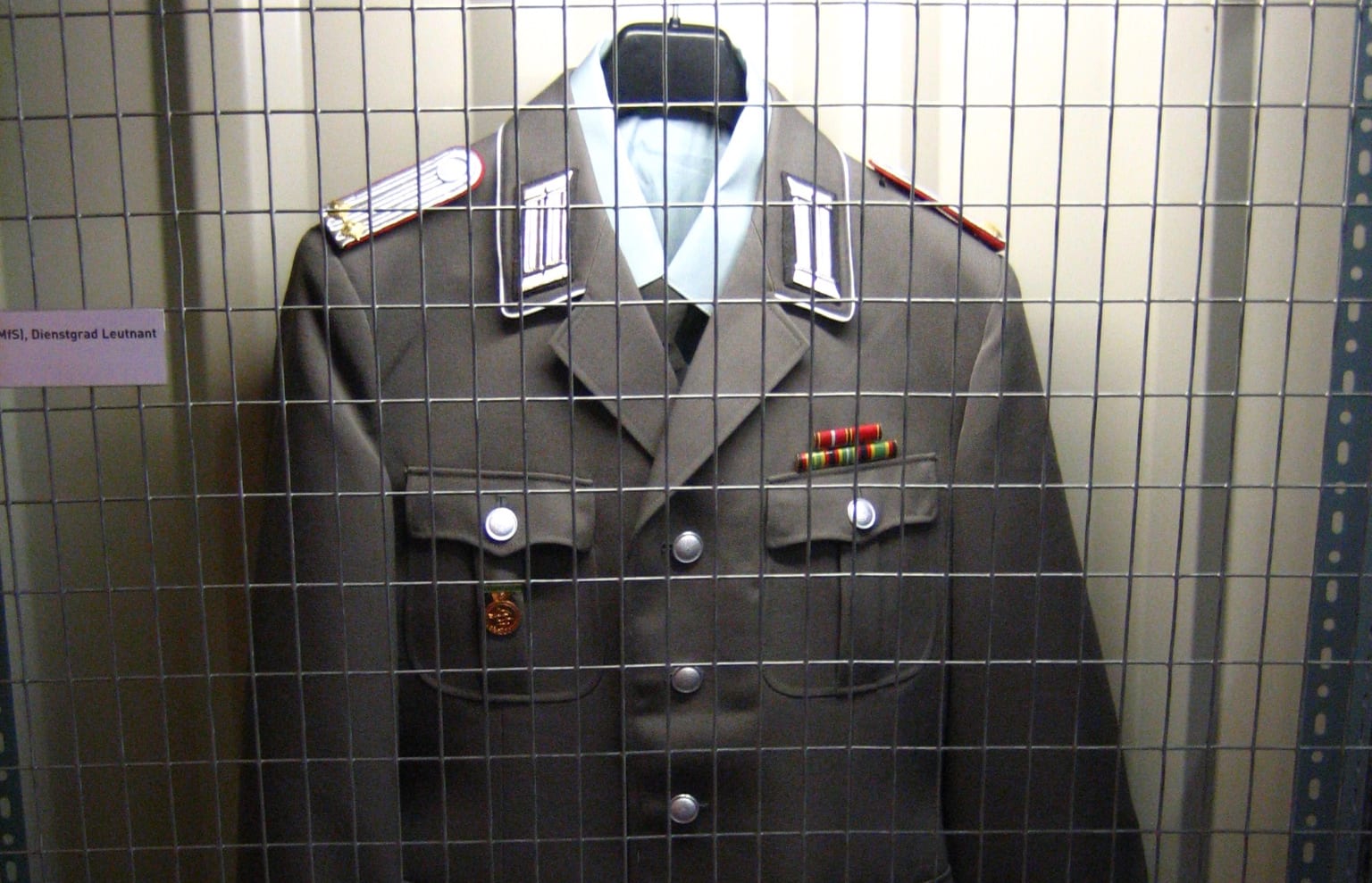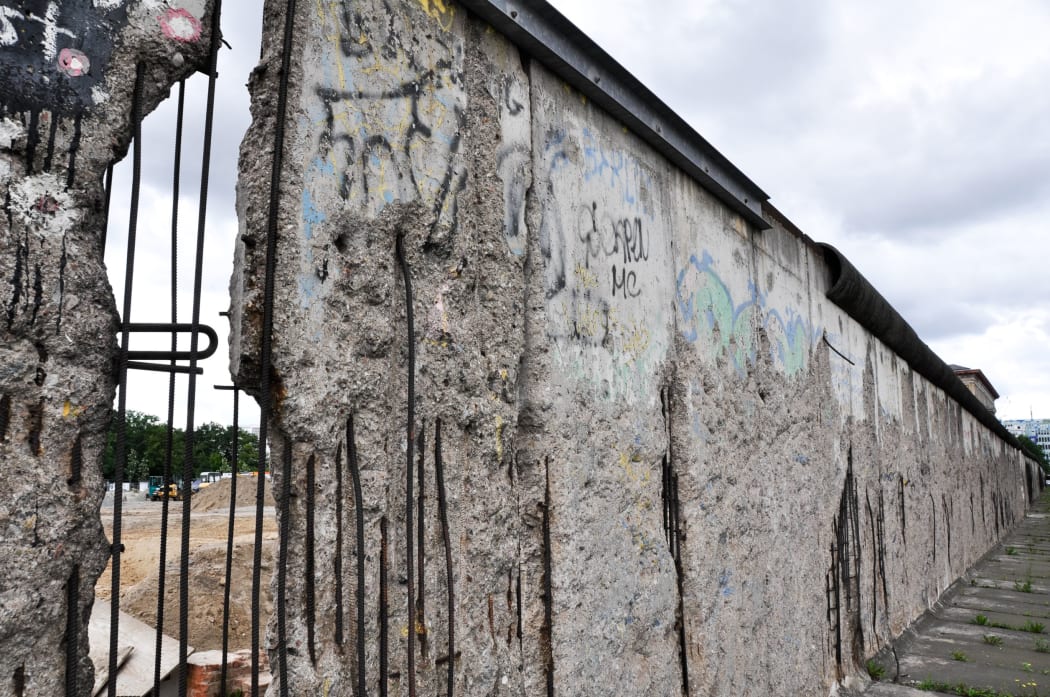When the Berlin Wall came down how did over 100,000 Stasi officers manage to disappear?
Former FBI agent Ralph Hope investigates what happened to the former East Berlin spies in his new book The Grey Men.

A Stasi uniform Photo: Luis Villa del Campo / CC BY 2.0
Hope discovered ex-Stasi officers working everywhere from the Russian energy sector to the police force and even for a German government department tasked with prosecuting Stasi crimes.
In the book he examines why they have never been called to account.
After the Berlin Wall came down in 1989, the newly reunified Germany was an ideal environment into which former Stasi officers could assimilate, Hope says.
“When East and West Germany were rushing towards unification, they really didn't want to ask uncomfortable questions.”
Many ex-Stasi officers had access to over a billion pages worth of highly personal details about European citizens, stored in manila files.
German citizens continued to be afraid of the Stasi, he says, because of the potentially incriminating personal information they still had.
Prior to Germany's reunification, the East Germany Stasi had many ways of keeping people in line, Hope says.
“One method is [they] could simply lock you up and take people off the street. And they did that to at least 280,000 people who were imprisoned, terrorised and in some cases kidnapped, some murdered and some driven to suicide.”
Other people simply had their everyday lives interfered with by the Stasi, he says.
“They could prevent you from getting into a school, prevent you from getting a job, play various types of mind games with your day-to-day life, the intent to just distract you and to veer your life to another direction that they felt was safer for the government.”

Remains of the Berlin Wall, Germany Photo: 123RF
In his former career as an FBI investigator, Hope says his job was to “follow up on things that were hidden”.
He applied these skills in Germany to find out how so many Stasi officers had melted away.
“The Stasi officers never went away, they never packed up and went back to Russia, they never did that, they stayed and in some cases, just blended into society.”
Hope was intrigued by the responses he got from Germans when he started to ask questions about the Stasi.
“If I asked the question to normal citizens of that generation [who lived under Stasi rule] as to where they were, frequently the response I would get would be silence followed by a look of quiet desperation.
“If I asked somebody in the government or in the intelligence services or even in media, and we're talking in present-day, I'd get what I would call 'embarrassed silence'.”
Certain environmental factors enabled the former Stasi to blend in, Hope says.
“Number one is that people didn't want to ask the questions, companies suddenly had access to some highly trained technical people overnight and didn't want to ask where they came from.”
German privacy laws also played a big part, Hope says.
“Privacy became paramount, there were new privacy laws created in Germany, quite onerous laws, and then throughout Europe later. Those laws were quite effectively used by the Stasi to hide behind.”
Currently, the list of former Stasi officers that Hope came across cannot be publicised in Germany, he says.
“You can't publicise that list and people that do can be assessed with very large fines due to privacy regulations ... so the privacy of the Stasi officers became paramount, even over the victims.”

Photo: Provided
Very few former Stasi have ever been prosecuted, Hope says.
“In 1990 and 1991 there were thousands of investigation started about excesses and crimes ... but of those there were very few people that were charged, Stasi officers charged, and even fewer that were ever convicted of anything and of those that were convicted, I only found one that ever went to prison for something he did as a Stasi officer.”
Many former Stasi have benefitted from links with Russia, and even [Russian president] Vladimir Putin himself worked with Stasi in former East Germany during the 1980s, Hope says.
“He developed contacts and [Stasi] developed close contacts with him. And traditionally, the Russian energy machine has been filled with former Russian intelligence officers.
“So, it wasn't unusual that former Stasi officers will be welcomed. It was not a bad thing if you were a Stasi officer to go to the Russian energy machine, because they embraced that, and they continue to do that.”
Putin used his influence on German businessman and former Stasi officer Matthias Warnig when Warnig's construction company Nord Stream AG was planning a subterranean gas pipeline between Russia and Germany.
“They only had two ways for the gas pipeline to go - one was down in the middle of the Baltic Sea and the other was through Ukraine.
“Putin at that time, for his own reasons, didn't want it to go through Ukraine. And so, through the help of Mr Warnig and also the former chancellor Germany, it was it succeeded in being approved through Germany.
“And because of that it puts the Russian government's hand on the energy valve for a good part of Europe - it is a tremendous lever.”
Even today, Stasi organisations continue to entrench themselves in German society, Hope says.
“Stasi organisations are actively trying to shut down the Stasi archives and fold it into the National Archives in Germany which would make it less accessible to the average person or to people to uncover these things in the present.”
European journalists remain wary of revisiting this part of recent German history but time is running out for Stasi to be held to account, he says.
“It's not too late, but it soon will be. There are journalists in Germany and throughout Europe that are still uncomfortable about revisiting this because of what happens when they do.”

